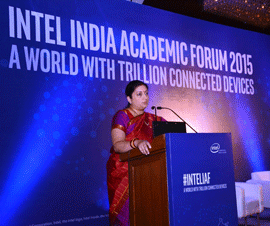Reinforces commitment to accelerate innovation and research in the country
News Highlights
-
Smt. Smriti Irani, Union Human Resource Development Minister inaugurated the Forum highlighting the importance of a world class ecosystem for innovation and research in India
-
The Forum, attended by over 100 academicians from top Indian education institutes, to focus on communications & networking, sensing & security, large scale machine learning.
-
Emphasizes the importance of building insights among academia on the latest technology trends and ensuring collaboration for breakthrough ideas and research.
New Delhi, October 8, 2015: Intel is hosting its second Intel India Academic Forum 2015 in New Delhi on the 8th and 9th of October, 2015. Themed ‘A World with One Trillion Connected Devices’, the two-day conclave will feature talk tracks on Communications & Networking, Sensing & Security and Large Scale Machine Learning; with the aim of accelerating technology innovation & academic research.
Marking the occasion, Intel also announced the setting up of 100 Internet of Things (IoT) centers across Indian academia institutions and awarded the Intel India PhD Fellowships for 2015 to five students.

Speaking at the event, Kumud Srinivasan, President, Intel India, said, “Innovation is in Intel’s DNA. For over 15 years, Intel has been building an ecosystem in India which enables innovation, research and skill development. Intel’s India Academic Forum is a platform for fostering insights on technology trends and for triggering collaboration opportunities between academia, government and industry, thereby enabling impactful innovation and research.”
The first day of the event featured a keynote on ‘Perceptual Computing: Adding human like sensing and interactions to computing devices’ Dr. Achin Bhowmik, Vice President, New Technology Group, General Manager, Perceptual Computing Group, Intel Corporation. The second day of the forum will include a keynote on the topic `Seeing through the corners of technology’ by Dr. Gopichand Katragadda, Group Chief Technology Officer and Innovation Head, Tata Sons, and Dr. Pradeep K. Dubey, Intel Fellow, Intel Labs, Director, Parallel Computing Lab, Intel Corporation will deliver a keynote on ‘Looking Beyond Exaflops and Zettabytes’.
As part of Intel’s continued efforts to promote innovation and research with higher education students, 100 Intel IoT Centres at academic institutions across India are being supported with Intel® Galileo boards, which are specifically designed for makers, students, educators, and DIY electronics enthusiasts to build product prototypes. Intel® Galileo boards are equipped with the required platforms and technologies and are aimed at empowering students on latest IoT skills and encouraging them to bring their ideas to reality.
Additionally, Intel has been providing grants to about 20 top institutes, to help accelerate technology advancement among academia on the latest technology trends and developments. Selected colleges are being given sensor kits/ Intel® Galileo boards. Intel has also been conducting regular workshops and providing curriculum content for these colleges.
As part of the Intel® India PhD Fellowship Program 2015, the five selected PhD students will be awarded a fellowship of up to Rs. 6,00,000 per annum and up to a period of four years that includes student stipend, contingency research funds and travel expenses to attend conferences and research forums.. The recipients of the Fellowship will work with their mentors at Intel to develop a deep understanding of the technological issues facing the industry and come up with breakthrough research in areas such as parallel computing, architecture, graphics, perceptual computing, sensing, power management, validation and communications.
For the last 15 years, Intel India has been consistently collaborating with academia with focus on initiatives like Intel® Higher Education Program and Intel® India PhD Fellowship Program (in its second year) to bring cutting edge technology expertise to leading scientific & technological institutes and universities across the country. Additionally, through programs like Initiative for Research and Innovation in Science (IRIS) Fair and Intel International Science and Engineering Fair (Intel ISEF) and Intel® Tech Challenge, Intel has been fostering a mindset of innovation and STEM education to create a strong pipeline of innovators in India.






